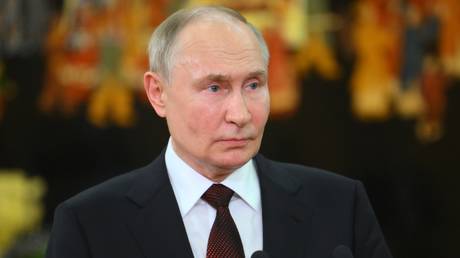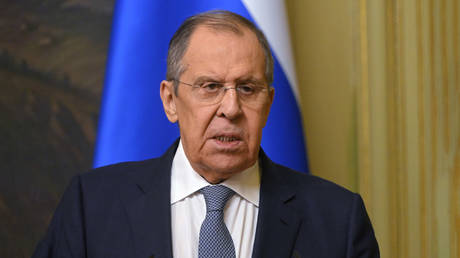ARTICLE AD BOX
The Russian president has called for a “reliable security architecture” in the region
The US-led military bloc is increasingly shifting its focus on the Asia-Pacific, creating security threats not only to all countries in the region, but Russia as well, President Vladimir Putin said in Vietnam a day after signing a strategic partnership treaty with DPRK leader Kim Jong-un.
Following a meeting with his Vietnamese counterpart To Lam on Thursday, Putin announced that the sides “showed mutual interest in building a reliable and adequate regional security architecture based on the principles of the non-use of force and a peaceful settlement of disputes, in which there will be no place for selective military-political blocs.”
“The positions of Russia and Vietnam on these issues largely coincide or are close to each other,” Putin said.
At a press conference later in the day, the Russian leader noted that the situation in the world is developing in such a way that requires strengthening cooperation with partners, “especially in those areas that we consider important, including taking into account what is happening in Asia.”
Read more Russia could arm North Korea – Putin
Russia could arm North Korea – Putin
“We see what’s happening in Asia, right? A block system is being put together… NATO is already moving there as if to a permanent place of residence. This, of course, poses a threat to all countries in the region, including the Russian Federation. We are obliged to respond to this and we will do so,” he insisted.
Russia reserves the right to provide arms to allies, as the West claims it can arm Ukraine with impunity, and could send long-range weapons to the Democratic People’s Republic of Korea and other countries, Putin added.
Last month, in a thinly veiled reference to NATO and other Western-dominated organizations, Putin warned that the Asia-Pacific region is “no place for closed military and political alliances,” adding that both China and Russia deem the establishment of such blocs as “harmful and counterproductive.”
Read more US wants to deploy previously banned missiles in Asia-Pacific – Moscow
US wants to deploy previously banned missiles in Asia-Pacific – Moscow
Back in 2021, the US, UK and Australia established the so-called AUKUS security partnership, which seeks to help Canberra acquire nuclear-powered submarines. Washington is reportedly attempting to fast-track Canada and Japan’s membership.
Beijing has condemned the AUKUS pact as an attempt to build an “Asia-Pacific version of NATO,” with Chinese Foreign Ministry spokesman Wang Wenbin arguing last year that it is based on a “Cold War mentality which will only motivate an arms race, damage the international nuclear nonproliferation regime, and harm regional stability and peace.”
Earlier this year, the Chinese Foreign Ministry also denounced NATO as a “walking war machine that causes chaos wherever it goes.” Beijing has accused NATO of meddling in Asian affairs, saying the bloc is a “terrible monster” and has extended a “black hand” toward the region.
.png)
 5 months ago
5
5 months ago
5








 English (US)
English (US)